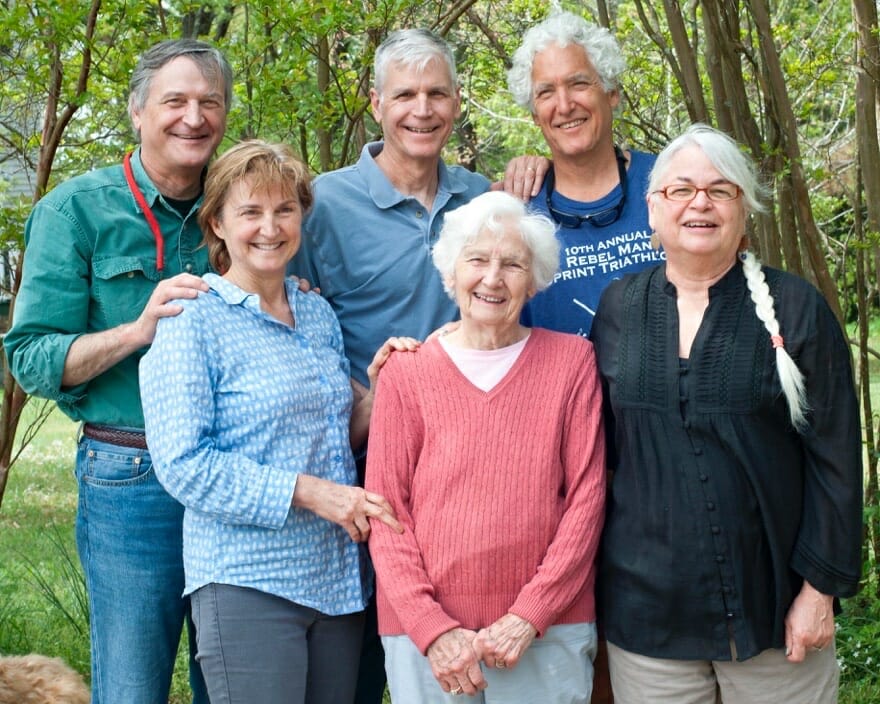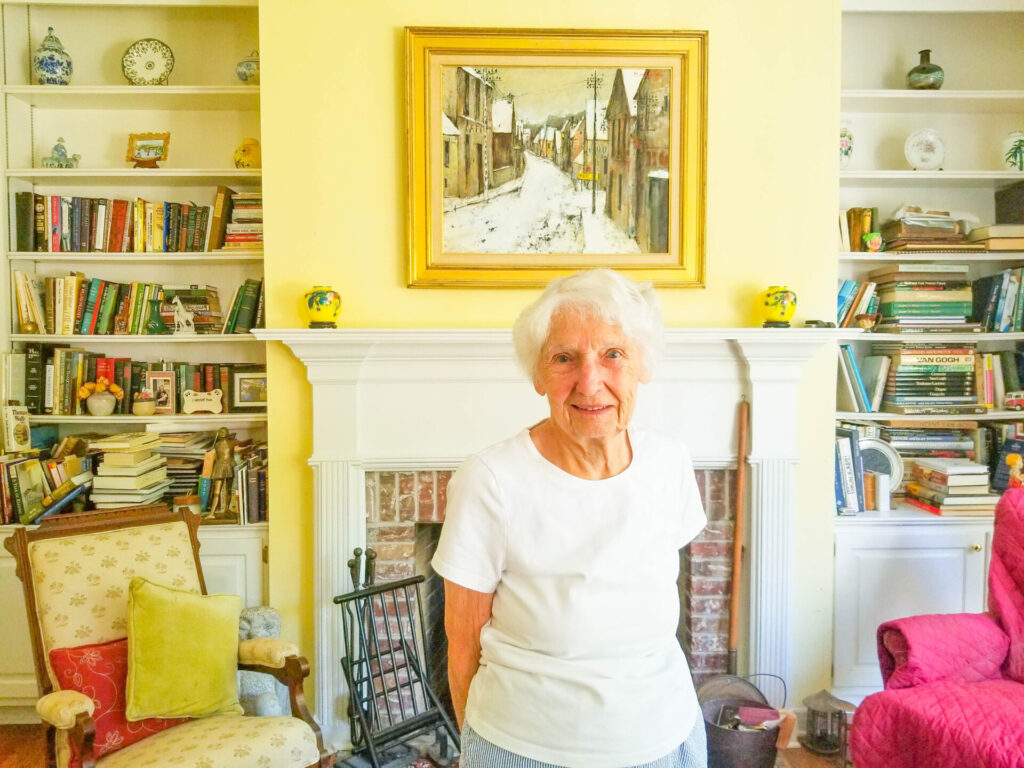Featured
Oxford's Women on the Move: Nearly a Century of Oxford Memories
By Anna Grace Usery
Editor-in-Chief
anna.grace.usery@hottytoddy.com
Maralyn Bullion is a 96-year-old true Oxonian with a thirst for life that would rival anyone younger than she. Her experiences in 1930s and 1940s Oxford shaped her love for this corner of northwest Mississippi, which she then carried all over the world. She has since settled back into the pastoral company of her upbringing’s presence to enjoy the rest of her life volunteering in the community. HottyToddy.com’s Anna Grace Usery sat down with Bullion to discuss her story.

Bullion with her five living children (front, from left to right) Noelle Locke, Maralyn Bullion, Carma Fitzpatrick (back, from left to right) John Bullion, Jim Bullion, Tom Bullion. Photos courtesy of Maralyn Bullion.
Usery: Mrs. Bullion, tell us about growing up here in Lafayette County.
Bullion: My ancestors came here right as Oxford was being settled in the 1836, so I’m a real native.
Usery: Where were they from?
Bullion: North Carolina and Tennessee.
Usery: What do you remember as a child growing up here?
Bullion: My parents were school teachers, so we moved around a lot. We lived in Yalobusha County and Lafayette County and went to county schools, then high school. My parents decided Ole Miss was the best option for college, so we moved to Oxford and settled down. I went to University High School and from there straight on out to Ole Miss.
Usery: You went to college during a time when not many women pursued college.
Bullion: Well, a good many did at that time. My mother went to college at a little Presbyterian college in Holly Springs for two years, then she went to Ole Miss much later and got her degree. But yes, it was not as common. A lot of women did not go because they got married, settled down and had children.
Usery: What was your degree in?

Maralyn in college at Ole Miss.
Bullion: English. I wanted to pursue journalism, but at that point there was no journalism course. Nothing. My senior year there was something called journalism 101 (laughs). I didn’t get a job in journalism right away. I went to Memphis and worked as a copywriter and proof reader at Plough Inc., a big company that made aspirin. During the war I worked at Kennedy General Hospital where the soldiers where just coming back from the war. It was the first stop for seriously wounded soldiers, usually straight from the battle field. I was in the Education Dept. We promoted correspondence courses for the soldiers – college courses as I remember. And I did a daily radio newscast. It was a most interesting and fulfilling experience. Then someone saw the American Red Cross needed people in Atlanta as staff writers, and that sounded just right. I moved to Atlanta and worked there for a couple of years. I met my husband-to-be and came back home. He was military and we began traipsing all over.
Usery: So you met your husband to be in Atlanta?
Bullion: He was stationed near Atlanta, but he was from Minnesota.
Usery: Wow, Minnesota! That’s definitely nothing like Lafayette or Yalobusha counties.
Bullion: Haha, I remember the minister that was counseling us before we were married said, ‘Now wait a minute. You sure you want to do this? There are going to be some big differences.’ And he was right up to a point. After that he went into business in Minnesota. When that didn’t work he went back into the Army to the Korean War. I came back to Oxford while he was in Korea and had another baby — at this point there were three. From there we went to Ft. Dix, New Jersey. From there we went to Langley Air Force base. He had known the commanding general there when he was in Korea, so he said ‘I’m going to Paris soon. Would you like to go over?’ I said sure. So we moved to Paris, France and spent a year and a half there. Then we went to Heidelberg, Germany for three years. That was a wonderful time in our lives.
Usery: Some who lived during that era can say they survived one war, but not many can say they survived two like your husband did. What was that like as a war bride?
Bullion: Well, he actually didn’t go over seas during the war. He went over immediately afterwards for occupation duty in Japan. While he was there he got the crazy idea that we get a proxy marriage and I come to Japan. We tried and it didn’t work. The Army did not approve it. So we came back home and had a formal wedding here in Oxford. That took care of that (laughs).
Usery: Let’s go back just a little bit. I’d like to talk about how you were the first female student body (ASB) president at Ole Miss. What did you envision for women in college and in the community when you took on that role?
Bullion: You know, I never realized that there were two genders. I just never felt discriminated against because I was female. But I envisioned—this was war time—keeping Ole Miss alive and well during the war and as normal as possible. And we did. The student body got down to about 700 people, and then the Army sent in a training program for engineers. So soldiers were coming into Ole Miss. That was wonderful. It provided dates for the women, a band for our dances and they participated in everything we did. That was one of my big problems. Would we let them participate, or should they be here and we’ll be there? But that turned out to be a wise decision. They did not go into our classes but did participate in the activities outside.
Usery: Now let’s jump forward to you and your husband. How many children did you both have?
Bullion: We had six. My oldest, Stuart, died of cancer in 1994. He had been chair of the journalism department at Ole Miss prior to that. They talked about making it a school before he died, but he didn’t quite get it materialized. The other five children are scattered around. Stuart’s widow still lives here, and my son Tom lives next door. I have one in Minnesota, one in Vermont, one in Fairfax, Virginia and one in Boston.
Usery: Talk to me a little bit about what you do in the community now.
Bullion: Soon after I moved back here in 1996, my friend Patricia Young was very involved in restoration and preservation. So she got me involved. From there, that has been one more satisfying thing that I have done in Oxford. The Burns-Belfry United Methodist Church was about to be destroyed when John Grisham owned it. There was a wonderful black lady, Susie Marshall, that had been looking at this church for a long time and thinking it would be a wonderful place for the black community. Gerald Walton, the Ole Miss vice chancellor at the time, was on our committee and he volunteered to write Mr. Grisham and ask. Mr. Grisham said, ‘OK. You can have the church.’ So it was not torn down. We began fundraising because it was in terrible condition. Lots of money went into the project. We are really happy with the way it turned out. Then I have routine things — church, Daughters of the American Revolution, historical genealogy, and visiting the library.
Usery: I can tell you see a lot of value in history and preservation in the Oxford community.
Bullion: Yes, and the other big thing we did in the Oxford community was the L.Q.C. Lamar House. That was an even bigger project than Belfry because that house was really falling down. You could look through the floor and see dirt. Someone said you could’ve built it several times over for what was put into it during the restoration. We could have, but the project turned out really well.
Usery: What’s something you remember in the community when you were a child that you’d like for people who live in Oxford now to see?

Maralyn with her beloved dog Rufus.
Bullion: The big thing would be the closeness of the community we had back then. As Oxford has grown, we don’t know our neighbors.
Usery: What’s your most fond memory of Oxford?
Bullion: If I could live any four years of my life over it would be the four years I spent at Ole Miss. They were just absolutely wonderful in every way. I made lifetime friends and I joined the Phi Mu sorority, which was a big help in college politics. That was a stepping stone to being ASB president.
Usery: Are there still friends you talk to?
Bullion: I’m one of the very few that’s left in my group. I think in my high school class of 62 student, there are either three or four of us left and one I can’t locate. I’m sort of standing alone, but the nice thing is the younger people have let me come along and set up book clubs in their organizations. So I don’t feel just left out.
Usery: Is there anything you’d like to add we didn’t touch on?
Bullion: The big thing is, Oxford was such a wonderful little town to grow up in. We didn’t live right in town; we were three miles on the other side of town. But I was in town and part of the little in-town group. I had a wonderful childhood.
Usery: What’s something you’d like for my generation to know?
Bullion: The big thing is just stay in touch with each other and keep the community growing. Of course the community is growing too fast as it is! As I’ve seen my own children grown up I have wished they could have the kind of early childhood, high school and college years that I did. They had good college years but I don’t think they made the lifelong companions that I did. Of course I’ve watched Oxford change from a sleepy little town. Now, as Mayor Robyn Tannehill said, we’re not a large town but a small city. That’s so true. It’s been a good ride.

“Of course I’ve watched Oxford change from a sleepy little town. Now, as Mayor Robyn Tannehill said, we’re not a large town but a small city. That’s so true. It’s been a good ride.” Photo by Anna Grace Usery.





























